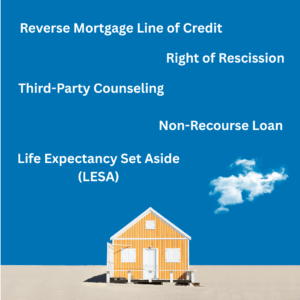
By Tyler Plack
Tyler Plack is the President of South River Mortgage. Tyler holds an active FHA Direct Endorsement (DE) underwriting certification and is the author of The Retirement Solution: Maximizing Your BenefitTyler is a seasoned entrepreneur and real estate investor renowned for his expertise in reverse mortgages and his commitment to addressing seniors' equity challenges. Tyler brings a unique perspective to his ventures, having built several successful companies throughout his career. His insights are frequently sought by industry publications, where he is recognized for his vast knowledge in the realm of reverse mortgages.
An avid investor in income-producing properties, Tyler is dedicated to helping seniors navigate their financial needs with compassion and expertise. When Tyler is not helping solve America's retirement crisis, he is a skilled pilot flying airplanes for fun.
A reverse mortgage offers many people a way to achieve financial security while aging in place. However, just like taking out a standard mortgage, getting a reverse mortgage is a major decision, and it isn’t one you should rush into.
You don’t have to become a reverse mortgage expert before choosing a lender. However, when you’re familiar with some of the most important terms in a reverse mortgage contract, you’ll be able to make your decision with confidence. These are some of the most important terms to know.
Home Equity Conversion Mortgage (HECM)
A HECM is the most common type of reverse mortgage, and it’s also the only type of reverse mortgage insured by the Federal Housing Administration (FHA). With a HECM, a homeowner is able to borrow against their existing home equity. They receive a lump sum or periodic payments, and the loan is repaid when the homeowner dies or moves.
Home Equity Conversion Mortgage (HECM) for Purchase
A HECM for purchase is a specific type of reverse mortgage. Instead of tapping into the equity of their existing home, a homebuyer makes a large down payment on a new home and takes out a HECM to pay for the rest.
This option is commonly used by retirees looking to downsize. They typically sell their existing home and use the proceeds to make a significant down payment on a new, smaller home.
Reverse Mortgage Line of Credit
When you take out a reverse mortgage, you may choose to convert some of your available equity into a line of credit (as opposed to receiving it in cash). Unused funds in your line of credit don’t accrue interest, so this may be a sound option if you don’t intend to use all of your funds.
Proprietary Reverse Mortgage (“Jumbo” Reverse Mortgage)
A “jumbo” reverse mortgage is not insured by the government, so lenders may exceed the lending limit placed on HECMs. These reverse mortgages are commonly chosen by owners of high-value homes.
Right of Rescission
The “right of rescission” is the borrower’s right to cancel the mortgage (for any reason) within three business days of closing.
Non-Recourse Loan
A HECM is a type of non-recourse loan, which means that the lender will never be owed more than the value of the home. If the home’s total value is less than that of the loan, the lender may not try to recover assets from the borrower (or their heirs) to make up the difference.
Are You Eligible for a Reverse Mortgage?
(Find out in 60 seconds)
Net Principal Limit
Like traditional mortgages, reverse mortgages come with closing costs. The net principal limit refers to the total funds that will be available to you after all closing costs are paid.
Life Expectancy Set Aside (LESA)
When you take out a reverse mortgage, you are still responsible for maintaining your homeowners’ insurance and paying for property taxes. However, if your lender thinks you may have trouble meeting eligibility requirements, they may establish a LESA to earmark funds for taxes and insurance.

Total Annual Loan Cost (TALC) Disclosure
This important disclosure tells borrowers how much the reverse mortgage will cost them annually. This cost includes interest, principal, and any applicable fees.
Payment Plan Terms
If you take out a reverse mortgage, you may elect to have the loan proceeds given to you in a lump sum or to receive them over time. If you receive payments in installments, you can generally choose from the following payment structures:
Term
You receive equal monthly payments over a predetermined period of time.
Modified Term
Receive a fixed monthly payment over a set period of time, and your remaining equity is set aside in a line of credit.
Tenure
Receive equal monthly payments as long as you abide by the terms of your mortgage.
Modified Tenure
Receive a fixed monthly payment if you follow all loan terms, and your remaining equity is set aside in a line of credit.
Third-Party Counseling
If you take out a HECM, the FHA requires you to attend mortgage counseling with an approved agency before applying. Your counselor will help you understand the terms of a reverse mortgage and decide whether this is the best option for you.
Considering a Reverse Mortgage?
A reverse mortgage can be helpful for many retired people, but it’s not the right option for everyone. Not sure if a reverse mortgage is for you? That’s where we come in.
The South River Mortgage team is committed to helping you make informed decisions about your retirement. If you want to take out a reverse mortgage, we’ll help you find one. Get an instant quote here today (totally free) to learn more.




